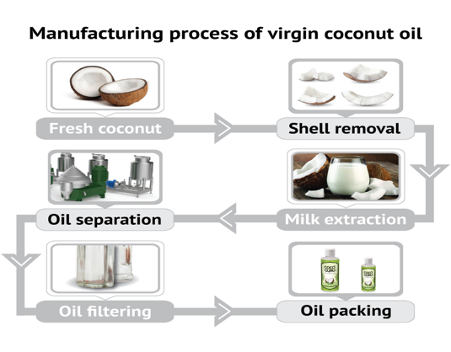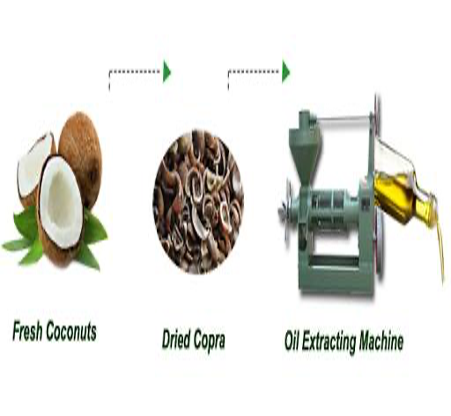HOW TO MAKE COCONUT OIL
(These methods have been given to me by many Jamaicans over the years and I have tried all of them. There are also many methods on the internet).
Method 1
Grate at least 5 to 10 coconuts. Extract thick milk only. If you add water and extract second and third concentrations, the cooking time will increase. So, stick only with the first thick extract. Pour the coconut milk in the frying pan and keep on low heat. It should boil and then simmer. Keep stirring but not necessarily non-stop. Towards the end point, the milk will separate into oil on the sides and yellowish residue. Filter off the residue and keep the oil in a cool place. You can use the second and third, diluted extracts for stew. Or rub it on your scalp for hair improvement.
Method 2
Take about two or three grated coconuts. Add very little water and pressure cook the coconut for 30 mins. Then extract thickened milk to yield oil. This is also a very good oil for children. Make little quantity, since shelf life is limited. A child can be given a couple of drops every day.
Method 3
Another method of extracting coconut oil is the expeller technique, in which the dried copra passes through a special screw press that compresses the coconut copra, squeezing about 75% of the oil from the coconut meat. Prying the meat away from the shell with a knife, cut the copra into ¼ inch pieces. There is no need to remove the brown outer lining, called the testa, on the coconut meat. Allow the copra to dry thoroughly. Place the lid on the newly extracted coconut oil and put it in a warm place to settle for 24 hours. Once the oil has separated from any solids, pour the oil off into a bottle for storage and place a cap on it, tightly, to seal it. Keep it away from the light and in a cool place to prevent it from becoming rancid. Can be made using small, hand-operated or motor driven presses, or for smaller amounts, a hand method using cheese cloth will also work.
Method 4
As an alternative to mechanical pressing in an expeller press, you can first shred fresh coconut copra straight from the shell with the testa removed. While this is not a very efficient method of extraction, it is simple. Place the shredded coconut into a large piece of cheese cloth. Twist the cheese cloth to press the shredded coconut. Gather the liquid in a clean bowl. Pour the liquid into a jar and allow the oil to separate from the coconut milk. Place the jar in the freezer and allow the milk to freeze completely. Then, simply cut the solidified coconut oil off and place in a clean glass bottle for storage.

LARGE-SCALE PRODUCTION
Large-scale production of coconut oil to produce virgin coconut oil looks similar to the home-made method. Further refining lowers the quality of the oil.
TYPES OF COCONUT OIL
Refined, bleached and deodorised (RBD) coconut oil is partially-hydrogenated (becomes more yellow). The clearer the oil, the less it has been changed.
Virgin, pressed, or homemade coconut oil is made at a lower temperature and without chemicals. It is white and has a coconut taste and smell.
DOSAGE
3 ½ tablespoons of coconut oil per day = 7 oz fresh coconut (½ coconut) = 2 ¾ cup dried coconut = 10 oz coconut milk. This equates to the amount of medium chain fatty acids a nursing child would consume in one day from mother’s breast milk.
RECOMMENDATION
- Make your own coconut oil
- Obtain virgin coconut oil from the Coconut Board or some other dependable source
- From the store, choose the clearest (less yellow) coconut oil. In an air-conditioned environment, the purer the oil, the sleepier it should appear, i.e., it will be more solid.
- Use coconut oil externally and internally. It is both preventative and curative.
- Plant a few coconut trees and keep the blessing going.
_____________________________________________________
Sources:
Fife B. (2005) Coconut cures: preventing and treating common health problems with coconut. Piccadilly Books, Ltd., 256 pages. ISBN-13: 978-0941599603
Dr. Sylvia Mitchell is a Senior Lecturer, Medicinal Plant Research Group, The Biotechnology Centre, UWI, Mona. Jamaican-raised & naturalized, she is African-born with English ancestry. Contact [email protected] or 876-545-2646.
Freedom Come Rain Disclaimer:
Articles carried by Rain Newspaper, similar in nature to the one above, are for informational purposes only. Kindly be aware that your health is your own responsibility.






